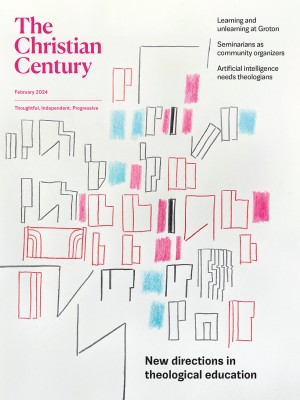Holy attachments
During the pandemic, I went six months without touching another human being. I felt starved.

(Illustration by Luisa Jung)
The season of Lent is a gift. It presents an annual opportunity to reassess where we are in our relationship with God and the world, with self and others. Jesus famously said, “Where your treasure is, there your heart will be also”; he reminds us that treasure is no simple and readily defined thing. Indeed, anything can become treasure, not only our possessions but our need for position or respect or our love for self or family or country. Jesus reminds us to reorient our attention toward the true treasure, God, the one who will set us free to love and live in abundance.
As a spiritual director, I am fascinated by these seeming distractions from God. Ignatius calls them attachments. After many years of counseling others and being counseled myself, I am only too aware that we all have attachments which get in the way of our relationship with God. I also know that these attachments—to possessions, to ambition, to endorphin highs— can be multiform. Each of us will negotiate a combination of attachments specific to ourselves and our circumstances.
Read our latest issue or browse back issues.
However, if Lent does offer an opportunity to reassess, it therefore also presents a chance to examine whether there is holiness to be found in some kinds of attachment. Recent years, especially those challenging days of the pandemic when I spent long periods in isolation, revealed for me the holiness of some attachments. Those attachments resolve into two categories: the proximal and the haptic.
The proximal can be understood, in anatomical terms, as referring to that which draws closest to the center of the body. It also has implications of attachment: the proximal is that which is nearest to the point of attachment. What it signals for me is the essential holiness of bodies. At the height of the COVID pandemic, I was instructed by the UK government to stay away from other people. This was for excellent reasons: my disability and underlying health conditions placed me at a much-heightened risk of hospitalization.
What made these instructions especially challenging is that I live on my own, so I did not come near another human being—no closer than two meters—for nearly five months. I had no real proximity to other bodies. I realized just how deprived I was when one day I left open the back door to my house, and a neighbor’s cat walked in. Before it left, it allowed me, just for a few seconds, to stroke its neck. I almost cried at this proximity to another creature.
The proximal leads me to another important, dare I say holy, kind of attachment: the haptic. The haptic relates to our sense of touch. It is derived from haptikos, “able to come into contact with,” which itself has an etymological history in haptein, “to fasten.” Touch always has dangerous, precarious, and risky connotations. Unwanted touch can be utterly vile and entail violation. I know what it is to be touched inappropriately by another, and the thought of it makes my skin crawl. Yet part of the potency of touch lies in its precariousness. For it is also the place we can negotiate that which helps us hold fast to the holy and allows God to hold fast to us.
Once again, that testing time of deprivation, the pandemic, was crucial for my appreciation of the importance of the haptic. I did not physically touch another human being for something like six months. It was nearly a year before I hugged someone, received a kiss, before I was held. During those long months of isolation, I felt starved. I was so hungry. My denomination granted me permission to preside at mass solo, on behalf of the cure of souls, but I was so hungry for more. I was hungry for the full feast of Eucharist and to be proximal to the fullness of God’s touch shown in the body of Christ.
During that painful season I cried out, “Oh, for the table around which we gather and share a cup and broken bread, passed hand to hand. Oh, to have God on my tongue; oh, to place my hands in his side; oh, to anoint his body with perfume.” I know we can meet others through the medium of screens; we can be proximate to digital bodies. But, dear Lord, is there anything like being fed in the flesh?
Fasting is one of our most powerful ways of drawing closer to God. It is, of course, to be distinguished from enforced deprivation, such as many experienced during the pandemic and far too many experience on a daily basis. As someone who was deprived of bodies—of touch, of proximity—I became saturated with the avatars of others on screens. I was isolated; I never left home in order to come home. There was no going out or coming in. The world was in my world. My imagination became peopled with screens.
Nonetheless I am inclined to look back on my pandemic deprivations as an experience of holy fasting. Part of fasting’s holiness lies in what it reveals in terms of our priorities; it can expose what we treasure, and sometimes it exposes that treasure as empty and toxic. I would never want to go back to those days of pandemic. I feel my skin crawl when I think of them. Nonetheless, in the midst of that time of trial I found good and holy things—and so much of that holiness was found in the longing for the haptic and the proximal.







